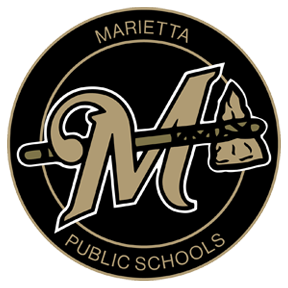In our world, there are tough jobs. Some are hard because of physical labor, others because
working with the public is difficult. And then there are some jobs that are really challenging, like
those in education, and of them, principals have some of the toughest.
They’re stuck right in the middle of a tricky crowd, trying to comply with a local board of
education as well as a state department of education, at the same time providing necessary
support for their teachers and staff, all the while pleasing a herd of kids – and their parents. The
job of a principal is one where it’s arguably impossible to make everyone happy, and yet eight
brave souls at Marietta try it every day.
“Being a principal is often a lonely, thankless job,” said district superintendent Brandi Naylor,
“and I’d put our team up against any in the state.”
That “team” that Naylor refers to consists of high school principal Michael Oakley and his
assistant Josey Goode, middle school principal Carrie Tucker and assistant Alyson Stokes,
elementary principal Dana McMillin and assistant Amber Boatright, and primary principal Ann
Rutledge and assistant Amanda Sanders.
While many in the public believe that a principal is just a “bad guy” who polices student behavior
and makes annoying calls to parents, their duties are many.
Principals create master schedules and provide support for teachers in the form of curriculum,
instructional leadership, and classroom resources. They work to promote student attendance
and keep track of a plethora of data, such as student grades.
They also coordinate and cover duties, like drop-off and pick-up for younger students and class
breaks and lunchtime for older students. Someone must be always watching students during the
day, and part of that time, it’s a principal. They also oversee numerous school activities and
functions, both during the day and after hours.
And, yes, they do deal with student behavior issues both on campus and on the school bus, and
they do communicate with parents/guardians about student concerns.
But all these duties work towards one end goal: student success. And that goal is the reason
that all of Marietta’s principals chose to go into school administration. With no exceptions, all
eight of them said they wanted to become a principal because they saw it as a way to make a
larger impact on students than they could as a classroom teacher.
“As a teacher, I controlled four walls,” said Oakley. “As a principal, I help many students.”
And if the goal of principals, student success, is the same as the community’s – which it should
be – then it makes one wonder: why do we sometimes make it so hard for them? When asked
about the most difficult part of an already difficult job, their answers might surprise you. Some
describe the loneliness of the job, and feeling the heavy load of making decisions that affect so
many people.
“Parents want what’s best for their kids, but don’t always see the big picture, which includes all
students and staff,” explained McMillin. “Hard decisions have to be made. I can’t always explain
why, mostly because of confidentiality, but everything we do is to ensure that students are
leaving us better than when they came to us.”
Principals make decisions daily knowing that someone isn’t going to be pleased with what they
decide. Much of what they do is behind the scenes, and their job is to take on the heavy weight
of making choices, many times fighting public perception while they do it.
“We do so much good that the community never hears about, but they do hear about negative
things that may or may not be true,” said Goode. “That makes us look like the bad guys when
we are doing our best to help students. Good days and bad, we have their best interests at
heart and every day we show up for them.”
Middle school principal Carrie Tucker, known for her ability to get straight to the point of the
matter, cited battling social media and cell phones as the toughest part of her job.
In these days, it is simple for a disgruntled individual to make a negative post on social media
and schools are all-too-often the target. Sometimes those posts contain sentiments that an
individual would never say aloud, but social media lends a lack of accountability, and with that a
lack of sympathy for the damage the post can cause. Those who compose the negative
comments seem to forget that the targets of their words are human beings who have families
and children. And feelings.
But despite the frustrations of their jobs, principals believe the rewards outweigh the difficulties,
and they’re quick to share them.
“It’s wonderful being part of our students’ educational journey, watching as they grow and move
from one grade level to another,” Rutledge smiled.
“The staff and students at Marietta are why I am here, and I try to give them my best every day,”
said Boatright, a Marietta grad who’s now investing in her alma mater.
Tucker, again, cut through the dross to the gold.
“One of my favorite quotes is from Eleanor Roosevelt, when she said, ‘For our own success to
be real, it must contribute to the success of others,’” Tucker explained. “The most fulfilling part of
my job is witnessing our students’ accomplishments and knowing that I played a small part in
their success.”
That’s pretty much a principal in a nutshell: they do their job so other people can succeed.
Sometimes it’s like riding a unicycle through a minefield while juggling lit sticks of dynamite and
balancing a birthday cake atop your head, but they do it. The “thank you’s” are few and far
between, and it’s often lonely at the top, but they’re doing the best they can. So give ‘em a
break.
